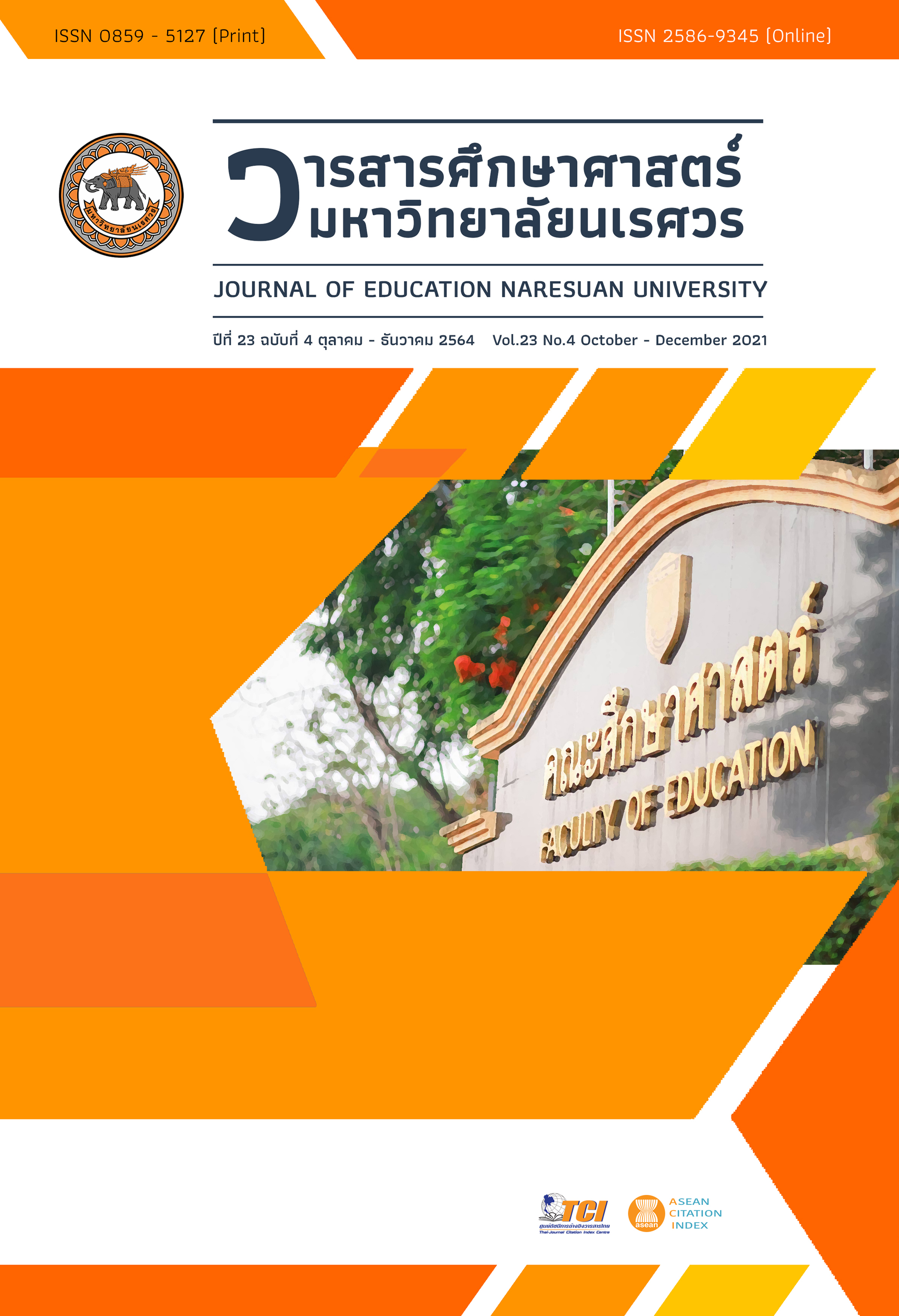EFFECT OF LEARNING BY USING PROBLEM-BASED LEARNING TOGETHER WITH THE MOLECULAR ORBITAL MODEL WITH ANTI-BONDING ORBITAL ON DEVELOPMENT THE ANALYTICAL THINKING SKILL AND LEARNING ACHIEVEMENT OF SUBSTITUTION AND ELIMINATION REACTION OF ALKYL HALIDES OF SCIENCEPRE-SERVICE TEACHERS ผลการจัดการเรียนรู้โดยใช้รูปแบบปัญหาเป็นฐานร่วมกับการใช้แบบจำลองออร์บิทอลเชิงโมเลกุลแบบต้านพันธะต่อการพัฒนาทักษะการคิดวิเคราะห์และผลสัมฤทธิ์ทางการเรียน เรื่อง ปฏิกิริยาการแทนที่และการกำจัดของสารแอลคิลเฮไลด์ ของนักศึกษาวิชาชีพครูสาขาวิชาวิทยาศาสตร์
Main Article Content
Abstract
The purposes of this study were to 1) develop analytical thinking skills of the pre-service science teachers for substitution and elimination reactions mechanisms of alkyl halides and 2) compare between before and after learning outcomes of the pre-service science teachers by using problem-based learning together with the molecular orbital model with anti-bonding orbital. The samples of this research were 23 students of the 2nd year pre-service science teachers. The research tools used were: 1) learning management plan for the substitution and elimination reaction of alkyl halides, 2) pre-test and post-test of analytical thinking skill including 6 subjective items 30 point, and 3) pre-test and post-test in multiple-choice 30 points. Data was analyzed statistically from mean (), standard deviation (S.D.) and t-test dependent. The research was found that:
1. The analytical thinking skill for the substitution and elimination reaction mechanisms of alkyl halides of the pre-service science teachers after using problem-based learning together with the molecular orbital model with anti-bonding orbital was significantly higher than before learning at .01 significance level.
2. The learning achievement in learning the substitution and elimination reaction of alkyl halides of the pre-service science teachers after using problem-based learning together with the molecular orbital model with anti-bonding orbital was significantly higher than before learning at .01 significance level.
Article Details
The owner of the article does not copy or violate any of its copyright. If any copyright infringement occurs or prosecution, in any case, the Editorial Board is not involved in all the rights to the owner of the article to be performed.
References
Chaiyen, Y., Bunsawansong, P., & Yutakom, N. (2007). Thai high school students’ conceptions about chemical equilibrium. Songklanakarin Journal of Social Sciences and Humanities, 13(4), 541–553. [in Thai]
Coll, R. K. (1999). Learners’ mental models of chemical bonding (Doctoral dissertation). Australia: Curtin University of Technology.
Coll, R. K., & Treagust, D. F. (2001). Learner’ mental models of chemical bonding. Research in Science Education, 31, 357–382.
Gilbert, J. K. (2004). Models and Modelling: Routes to More Authentic Science Education. International Journal of Science and Mathematics Education, 2(2), 115–130.
Gilbert, J. K., & Ireton, S.W. (2003). Understanding models in earth and space science. Arlington: NSTA Press.
Greca, I. M., & Moreira, M. A. (2000). Mental models, conceptual models and modeling. International Journal of Science Education, 22(1), 1–11.
Katkarn, P., Srisanyong, S., & Singlop, S. (2017). The effect of problem-based learning for development science learning achievement, problem solving ability and scientific attitude of Pratomsuksa 6 students. Journal of Education Naresuan University, 19(1), 77-89. [in Thai]
Kawatkul, A., Prommas, C., & Chaiprasert, P. (2015). Effects of learning on biomolecule using model-based learning to develop scientific conceptions and constructing scientific model ability for Mathayomsuksa six students. Journal of Education, 26(2), 42-55. [in Thai]
Khammani, T. (2005). Cognitive science teaching for effective learning process (4th ed.). Bangkok: Chulalongkorn University. [in Thai]
Khongton, T., Sukhummek, B., & Faikhamta, C. (2016). Development of grade-11 students’ conceptions about organic chemistry through model-based learning. J. Res. Unit Sci. Technol. Environ. Learning, 7(1), 62-76. [in Thai]
Kuathan, N., Faikhamta, C., & Sanguanruang, S. (2011). The secondary students' mental models of chemical bonding. Songklanakarin Journal of Social Sciences and Humanities, 17(2), 299-314. [in Thai]
Makmee, P. (2011). Problem - based learning. EAU Heritage Journal, 5(1), 7-14. [in Thai]
McCollum, B. M., Regier, L., Leong, J., Simpson, S., & Sterner, S. (2014). The effects of using touch-screen devices on students’ molecular visualization and representational competence skills. Journal of Chemical Education, 91(11), 1810-1817.
Ministry of Education. (2017). Indicators and core learning content science learning subject group, revised edition B.E. 2560 (2017). Bangkok: Ministry of Education. [in Thai]
Ozmen, H. (2004). Some student misconceptions in chemistry: A literature review of chemical bonding. Journal of Science Education and Technology, 13(2), 147–158.
Pattiyanee, S. (2003). Education measurement (4th ed.). Kalasin: Prasankanpim. [in Thai]
Suwannoi, P. (2015). Problem–based learning: PBL. Retrieved May 27, 2017, from https://ph.kku.ac.th/thai/images/file/km/pbl-he-58-1.pdf
Tuckman, B. W. (1999). Conducting educational research (5th ed.). New York: Harcourt Brace College Publishers.
Wongaiam, S., Chaiprasert, P., & Srisangyong, S. (2016). The development of learning achievement and ability in problems solving thinking in life and environment for grade 10 students using problem based learning. Journal of Education Naresuan University, 18(2), 194-201. [in Thai]
Wongsaphan, M. (2013). Elevating learning through analytical thinking. Journal of Education Thaksin University, 13(2), 125-139. [in Thai]


